The report of the 19th CPC National Congress has clearly proposed to promote the deep integration of the Internet, big data, artificial intelligence and real economy and cultivate new growth points and new momentum in the areas of high-end consumption, innovation and leadership, green and low-carbon, sharing economy, modern supply chain and human capital services. With the construction of a modern economic system, China’s sharing economy is accelerating its transformation from the initial stage to the growth stage in 2017, which has played an important role in fostering new momentum of economic development and promoting employment. Its International influence has increased significantly, which has become a prominent highlight of China’s economic transformation and development in the new era. The School of Economics and Management (SEM) of Beijing Jiaotong University (BJTU) responded to the call of the times, complied with the economic and social development trends, and actively explored the development of business schools in the new era and the new economy. On May 31st, 2018, the Fourth International Advisory Committee (IAC) Meeting was held by SEM. Chinese and foreign experts gathered at the Yanxi Lake International Convention and Exhibition Center and discussed “business school development under the sharing economy”.

The Meeting
Focusing on Hot Topics of the Times and Discussing “Business School Development Under the Sharing Economy”
China is an innovator and leader of the sharing economy, which has attracted global attention. The Fourth International Advisory Committee (IAC) Meeting of SEM, BJTU, focused on “business school development under the sharing economy”. Chinese and foreign experts invited to attend the meeting included: Zheng Dazhao, Dean of Business School of Hong Kong Polytechnic University; PerCramér, Dean of School of Business, Economics and Law in Gothenburg University, Sweden; Christian Delporte, Senior Consultant of Quality Service Department in EFMD; Vince Gowan, Chairman of International Research and Development Center of Indonesia; Ji Xiaonan, former Chairman of the Supervisor Department of State-owned Key Large Enterprises; Len-kuo Hu, Professor of National Taiwan University of Political Studies; Li Pumin, Secretary General of the National Development and Reform Commission; Andre Loesekrug-Pietri, Chairman of ACAPITAL Fund Company; Ma Zhengwu, Chairman of China Chengtong Holding Group Co., Ltd.; Wei Shen, Vice President of Deakin University, Australia; Andrea Sianesi, Dean of MIP School of Business, Milan Polytechnic University, Italy; Hong Feng, Assistant Principal of Thailand Zhengda Management College, and President of China Postgraduate Center; Xue Xiaolin, Global Vice President of Amazonia; Zhoulin, Dean of Antai College of Economics and Management, Shanghai Jiaotong University, et al. Focused on the theme of “sharing economy”, they held discussions on topics such as “personnel training”, “scientific research and development”, “social service” and “think tank construction”, and provided valuable suggestions for the development of the college. It is generally believed that the sharing economy, as a new economic form, a new way of allocating resources and a new concept of development, embodies the inherent requirements of concept innovation, technological innovation, mode innovation and system innovation. It is the most active new energy and epitomizes the era of innovation-driven development. The development of international business schools should actively respond to the development tide of “sharing economy”, promote the sharing and development of global teaching resources, provide strong intellectual support for the sharing economy, and enhance the internationalization level of personnel training, scientific research, and social services in business schools.
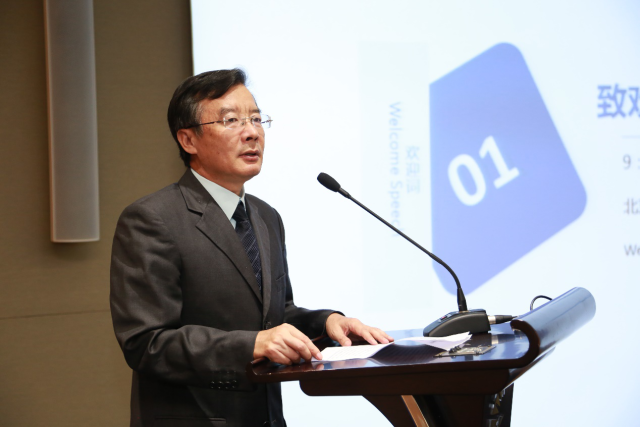
Professor Guan Zhongliang, Vice President of Beijing Jiaotong University
At the meeting, Professor Zheng Dazhao, Chairman of IAC and Dean of Business School of Hong Kong Polytechnic University, introduced the members of the International Advisory Committee. Professor Guan Zhongliang, Vice-President of Beijing Jiaotong University, delivered the opening speech and presented the letter of appointment to the new IAC members. In his speech, he pointed out that Beijing Jiaotong University was committed to training talents and transforming scientific achievements in the field of rail transportation. With the rapid development of China’s rail transportation, higher requirements have been put forward for personnel training, discipline construction and transformation of scientific achievements in colleges and universities. Beijing Jiaotong University, as a business card for China’s transportation, should continue to be open to the world. Internationalization is a general trend in the development of higher education in the world. It is an urgent requirement for China’s higher education, and also the only way for Beijing Jiaotong University to build a world-class university with distinctive characteristics. He stressed that the School of Economics and Management of BJTU is applying for the accreditation of EQUIS and AACSB and is committed to building a first-class business school that is in line with the international standards, so it should learn from the advanced experience of the world’s first-class business schools and strive to improve its international development level. The successful holding of this meeting will help the school to achieve its established goals.
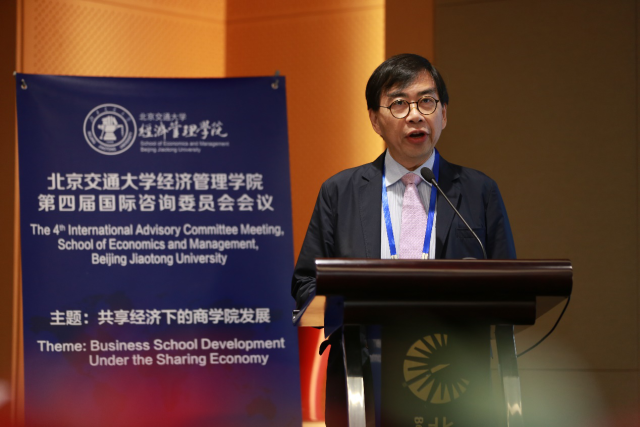
Professor Zheng Dazhao, Chairman of IAC and Dean of Business School of Hong Kong Polytechnic University
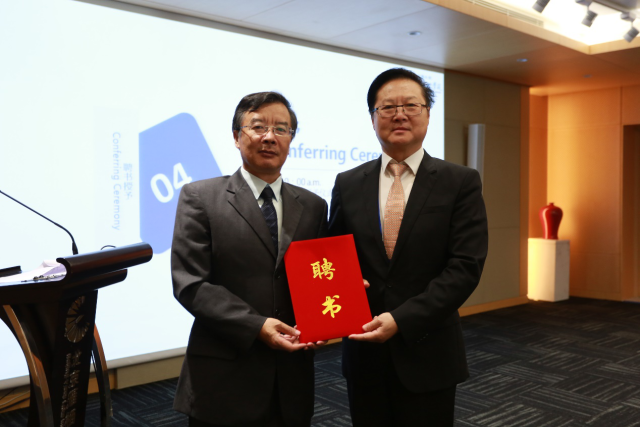
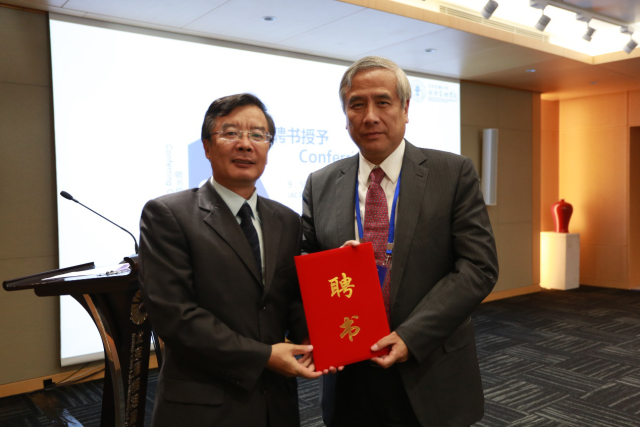
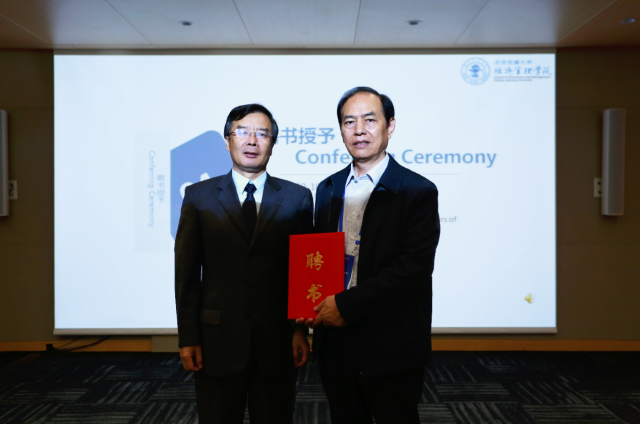
Presented the Letter of Appointment to the New IAC Members
The International Advisory Committee of the School of Economics and Management of BJTU was established in 2013. It is composed of dean of business schools from top universities in the UK, Canada, Italy, Sweden, Indonesia, Taiwan, Hong Kong and other countries and regions, as well as top experts from relevant Chinese and foreign institutions. It aims to gather the wisdom of global business studies and promote the reform and development of the school. The 3rd IAC Meeting in 2017 focused on the “Opportunities and Challenges of Business Schools under the Belt and Road Initiative”. Chinese and foreign experts discussed the cooperative development of business schools under the “Belt and Road Initiative”, which triggered wide public concerns.
Contributing Business Wisdom and Making a Positive Voice for the Development of “Sharing Economy”
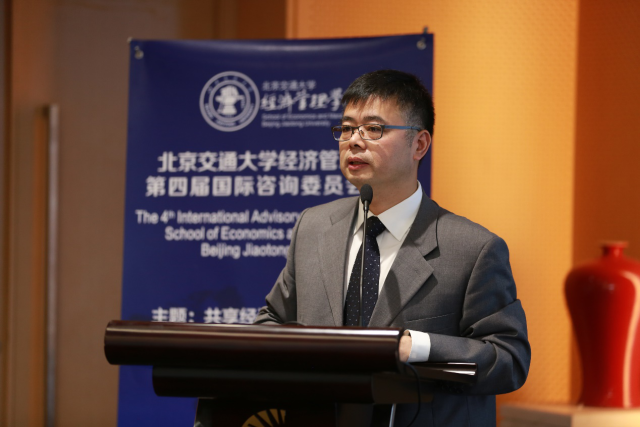
Professor Zhang Qiusheng, Party Secretary and Dean of School of Economics and Management, Beijing Jiaotong University
At the meeting, Professor Zhang Qiusheng, the secretary of the Party Committee and the dean of the SEM, made a theme report on the “business school development under the sharing economy”, explaining the development suggestions put forward by the members of the 3rd IAC for the school and the improvement measures of the school in personnel training, scientific research, international exchange, social responsibility and brand building. He said that relying on a hundred years of accumulation, the School of Economics and Management of BJTU now has four first-level disciplines, nine major departments, wide resources and a complete education system. And its three disciplines rank top in China’s fourth-round discipline rankings. SEM has always been keeping up with the national strategy and industrial development, giving full play to its advantages in the fields of economy and management, and actively serving the development of China’s transportation, modern logistics, capital finance, information technology, construction of real estate, tourism and other industries through intellectual support, personnel training and professional services. The hot topic of the sharing economy has attracted the extensive attention of all faculty and students of SEM in the earlier period.
Professor Zhang Qiusheng introduced the representative scientific research development and theoretical and practical achievements of SEM in the field of sharing economy. In terms of theoretical practice and social service, Professor Rong Chaohe of SEM issued a paper “The Analysis of Space-time Economy of Internet Sharing Travel” in the authoritative publication “Administration World” of CSSCI, and published the book “Analysis of Economic Time and Space -- The Basic Framework and Its Application”. He was also invited to attend an expert-scholar symposium of the Beijing Municipal Government on “Building an Effective Governance System for Mega-cities” and put forward the view that “in order to ease the rush hour of commuting, the role of commuter rail should be given full attention, and the development model of commuter rail plus land should lead the development of Beijing’s metropolitan area”. Professor Ou Guoli’s article, “Encouraging Shared Use of Idle Bicycle Resources”, was included in the People’s Daily internal reference. Associate Professor Xiao Lingling and her team published the paper “On the Morning Commute Problem with Carpooling Behavior under Parking Space Constraint” in the AJG2015 (formerly ABS) four-star periodical “Transportation Research Part B: Methodological”. Professor Ju Songdong’s book, Logistics Network: Integration and Sharing of Logistics Resources, published in 2008, won the first prize of the 11th Outstanding Achievement Award for Philosophy and Social Sciences in Beijing and the third prize of the 6th Outstanding Achievement Award for Scientific Research (Humanities and Social Sciences) in colleges and universities.
In terms of personnel training, the project “Haoyi.com’s Idle Goods Trading Platform Based on O2O”, which was completed by Yang Linli, directed by associate professor Li Jing, won the second prize in the Beijing division of the 6th National College Students’ E-commerce Challenge of “Innovation, Creativity and Entrepreneurship”. Professor Ru Yihong instructed Zheng Zhanzhi, an undergraduate of logistics management, to complete the project “Research on New Models of Recycling Packages for Beijing Colleges and Universities”, which attracted the attention of various media, such as People’s Daily Overseas Edition, China Education Television, Beijing Radio and so on.
In terms of social services, SEM has signed strategic cooperation agreements with Mobike companies, Amap, Didi Tavel and other sharing economic enterprises to conduct research cooperation in various aspects such as Internet sharing economy, Internet sharing travel, and big data. SEM also cooperates with top international universities and scholars such as the Amsterdam Free University of the Netherlands and the University of Leeds in the United Kingdom to organize international exchange conferences, jointly apply for scientific research topics, carry out personnel training and scientific research cooperation, and carry out education, production, study and research collaboration to actively promote the development of the sharing economy.
Meeting the Challenges of the Times and Building Business Schools that Lead the Development of China’s Industries
The sharing economy is the result, as well as the source of innovation and development. It is changing the way of production, life style and way of thinking of the whole world. Although China’s sharing economy has not developed for a long time, it has taken the lead in the world in terms of market scale, innovative application, international influence and exploration of system innovation. While developing rapidly, it still faces many challenges.
With the accelerating application of information technology innovation and the obvious improvement of people’s cognitive level, the sharing economy is transforming from the initial stage to the growth stage. Agriculture, education, medical care and pensions are expected to become the new opportunities in the sharing economy. The construction of a multi-participatory collaborative governance system will accelerate this process, and the trend of international market expansion and governance cooperation will become more apparent. More and more social attention has been paid to the sharing economy, and the theoretical thinking of all society on it has become more rational and in-depth. However, compared with the rapid development of practice, theoretical research is still lagging behind and it is difficult to effectively support the government’s policy formulation, industry supervision, and corporate innovation. The contradiction between the rapid innovation practice and the lag of theoretical research is even more prominent, which poses a huge challenge to the development of business schools.
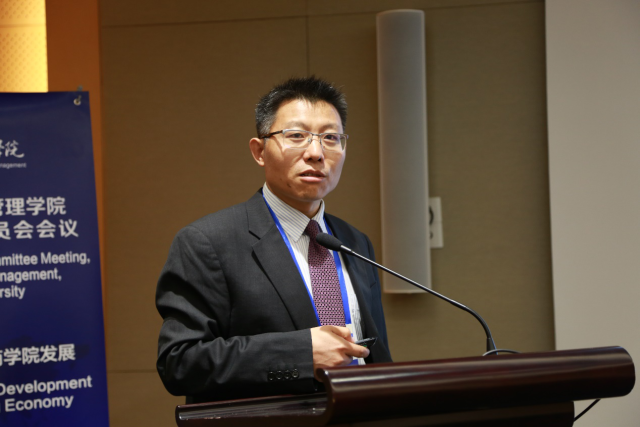
Professor Hua Guowei, Deputy Dean of School of Economics and Management, Beijing Jiaotong University
Professor Hua Guowei, deputy dean of the School of Economics and Management of BJTU, summed up the contents of this meeting with the key words of “thanks”, “expect” and “share” in the closing ceremony. He said that the development of SEM is inseparable from the strong support of all the members of the IAC. He expected that all members would share sustainable resources with SEM in scientific research, personnel training, internationalization of teaching materials, think tanks, etc.
Beijing Jiaotong University started in 1909, with a long history and a solid foundation for running schools. In 2011, SEM was approved by the Ministry of Education as one of the 17 first pilot schools in the country. In 2015-2017, SEM won 3 PALMS accreditation in the world’s best business school at Eduniversal, ranking 11th among the best business schools in China. On December 28, 2017, the Center for Academic Degrees and Postgraduate Education of the Ministry of Education announced the results of the fourth round of academic evaluation in the country, and the three first-level disciplines in SEM are among the top. Among them, Business Administration ranks the top 10% (A-), Applied Economics the top 20% (B+), Management Science and Engineering the top 20% (B+).
Since its foundation, Beijing Jiaotong University has served the development of the transportation industry with the attitude of “learning and practicing” and the patriotic feeling of “saving the nation by industry”. School of Economics and Management originated from the beginning of BJTU and has the longest history. For more than a century, the development of SEM has always been mutually confirmed and closely overlapped with the fate of the country and the development of BJTU, and has become increasingly distinctive. And “industry” is the label and characteristic of the century-long development of SEM, and “leading the development of Chinese industry” is also the mission and duty of all faculty and students. Based on China’s industrial practice, SEM has contributed its business wisdom, actively integrated into industrial activities, discovered the potential needs and solved the practical problems of the industry, and made creative contributions in theory. In the future, SEM will rely on its comprehensive discipline system to provide theoretical guidance and intellectual support for the development of the sharing economy and even more industries. SEM will strive for the goal of “becoming a business school leading China’s industrial development”, under the guidance of the research of full industry chain, distinctive new think tanks, industry standards and data resources, industrial discourse rights, and industrial development models.
The meeting was attended by the leaders of the School’s External Liaison and Cooperation Department and the International Cooperation and Exchange Department, as well as all the leaders of SEM and so on.
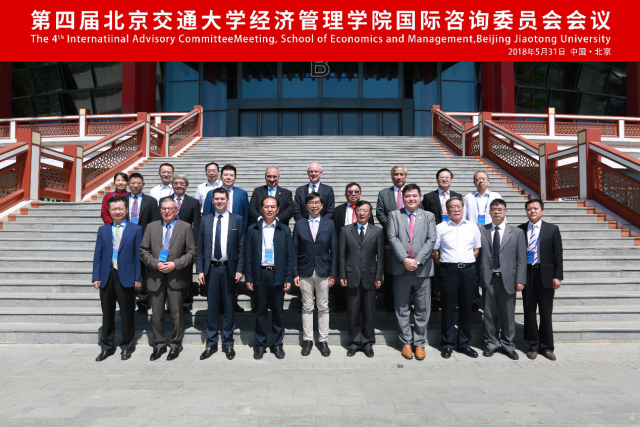
Group Photo















